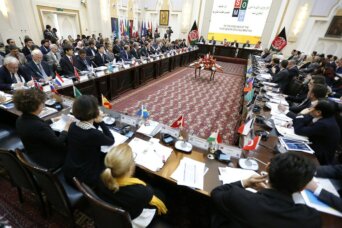- About
- Topics
- Picks
- Audio
- Story
- In-Depth
- Opinion
- News
- Donate
- Signup for our newsletterOur Editors' Best Picks.Send
Read, Debate: Engage.
| topic: | Peace and Reconciliation |
|---|---|
| located: | Afghanistan |
| editor: | Shadi Khan Saif |
Over the past several decades, Afghans have been painstakingly witnessing hasty ups and downs in a vague political arena on the peace front.
With both the country's elected government and Taliban asserting to represent them, the people of this war-ravaged country remain hostage to the fears of backlash from all sides, while trying to speak up for themselves.
Then, of course, there is the international and regional meddling going on, which makes the people's voice much quieter and less powerful.
This is evident as we see the venues of peace negotiation summits moving from one capital city to another country and yet another, instead of establishing a more humane barometer for these talks based on pledges of the warring parties regarding rights and liberties of the Afghans.
Most recently, the Moscow conference in the Russian capital was hardly any different, as the resolution adopted there seemed more to do with the concerns of the Kremlin than those of the common people in Afghanistan. Same goes with Pakistan and Iran, which are more inclined towards protecting their strategic gains in the country rather than standing for principles and human rights in its neighborhood.
It is true that while the unrest in Afghanistan has international roots and ramifications, the ultimate victims and immediate stakeholders remain the people of Afghanistan.
For instance, despite the blunt and imminent threat to their lives, members of the Afghan journalism community keep pushing barriers to guard the hard-earned liberty.
With a distinct level of press freedom, Afghanistan in recent years has been doing relatively much better than much of its immediate neighbors, where authoritative and oppressive regimes have been silencing the voices of free press through various tactics.
The heavy price young media professionals in towns and villages across the war-ravaged country have been paying is indicative of the fact that this fundamental democratic value remains fragile and vulnerable to threats.
Same goes with women and girls’ rights to study, work and fully participate in society.
From September 2020 to March 2021, at least 11 journalists and media workers were killed in such attacks, according to a U.N. report.
The warring factions, particularly the Taliban, must immediately commit to honouring these rights if it wishes to win the hearts and minds of people instead of dreaming to capture the state by spreading terror.
This is how the ongoing peace parley should be conducted in terms of its trajectory; it should not be viewed through the prism of greed for power and prestige.
Image: UNAMA News.

